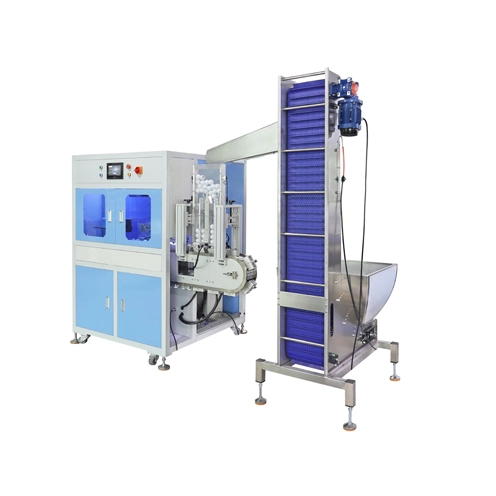Production falling behind demand? High-speed pad printers maintain quality while doubling your output.
High-speed pad printers deliver precision printing at 100-3,000 cycles/hour, using automated silicone pads to transfer intricate designs onto 3D objects with ±0.05mm registration accuracy while reducing labor costs by 60%. These machines keep pace with modern assembly lines without sacrificing print quality.
Three key production advantages:
90% faster than manual pad printing
50% less ink waste with automated systems
24/7 operation capability
Need production-grade printing that won't slow your line? This is how industrial pad printers achieve both speed and precision.
These automated systems use robotic arms and servo-controlled pads to pick up ink from etched plates and deposit it onto products moving along conveyor belts at speeds up to 1 meter/second while maintaining 100μ print resolution.
Speed-enhancing components:
Multi-axis robotics: Handles parts at 120+ pieces/minute
Quick-drying inks: Cures in 1.5-3 seconds
Vision systems: Verifies print quality at full speed
Automatic plate cleaners: Maintains consistency
Critical performance specs:
Cycle time: 0.8-2 seconds per print
Registration accuracy: 50 microns
Uptime: 98.5% (24/5 operation)

Still relying on slow manual printing? These productivity gains prove why manufacturers are upgrading.
The high speed pad printer increases throughput by 400% while reducing per-unit costs by 35%, handling complex prints on irregular surfaces that screen and digital printers can't touch at production volumes.
Tangible business impacts:
| Benefit | Manual Printer | High-Speed Printer | Improvement |
|---|---|---|---|
| Output | 200 pieces/hr | 1,000 pieces/hr | 5x faster |
| Labor Cost | $0.15/piece | $0.06/piece | 60% savings |
| Ink Waste | 18% | 6% | 67% reduction |
| Defect Rate | 3.2% | 0.8% | 75% fewer errors |
Real-world applications:
Automotive: Printing 1,200+ shift knobs per shift
Electronics: Branding 5,000 phone cases/hour
Medical: Marking 800 syringes/minute
Not all high-speed printers are equal - these specifications determine ROI.
Select machines based on your production volume, part geometry, and required precision - entry-level models start at $25,000 while fully automated lines exceed $150,000 with 18-month payback periods through labor savings.
Selection checklist:
<500 pieces/hr: Semi-automatic models
500-2,000 pieces/hr: Servo-driven automatics
>2,000 pieces/hr: Robotic integrated systems
Touchscreen HMI with 100+ program storage
Quick-change tooling (<5 minute job change)
Infrared drying for instant curing
Material handling automation options
Industry-specific recommendations:
Medical devices: ISO Class 5 cleanroom models
Automotive: Oil-resistant ink systems
Consumer goods: Multi-color stations
Confused by all the printing options? Here's how pad printing outperforms alternatives.
For printing on 3D surfaces at production volumes, high-speed pad printing delivers faster cycle times (0.8s vs 3s+), lower setup costs (80% less than screen printing), and better material versatility than digital or screen alternatives.
Technology showdown:
| Technology | Best For | Speed | 3D Capability | Cost Per Print |
|---|---|---|---|---|
| Pad Printing | Small-med 3D parts | 0.8-2s | Excellent | $0.003-0.008 |
| Screen Printing | Flat surfaces | 3-5s | None | $0.002-0.005 |
| Digital Printing | Graphics/2D | 8-15s | Limited | $0.015-0.03 |
| Laser Marking | Permanent marks | 2-5s | Good | $0.01-0.02 |
When pad printing wins:
✅ Curved/small surfaces
✅ Multi-color registration
✅ High-volume production
✅ Cost-sensitive applications
High-speed pad printers from haover are production powerhouses - combining unmatched 3D printing versatility with industrial speeds that keep assembly lines moving efficiently while maintaining perfect print quality.


